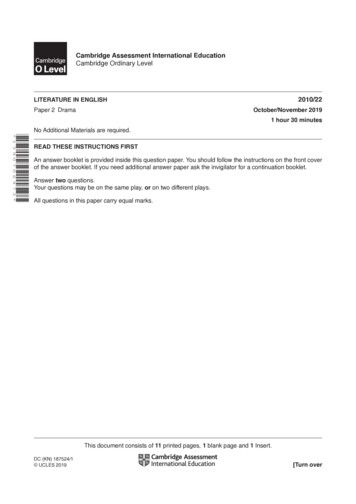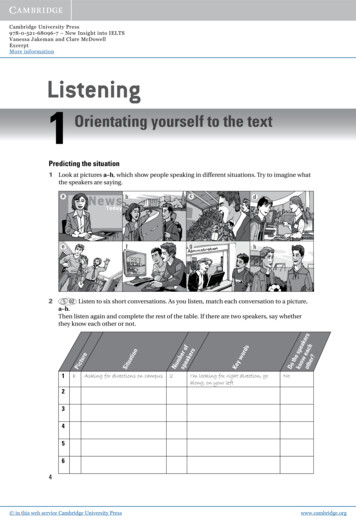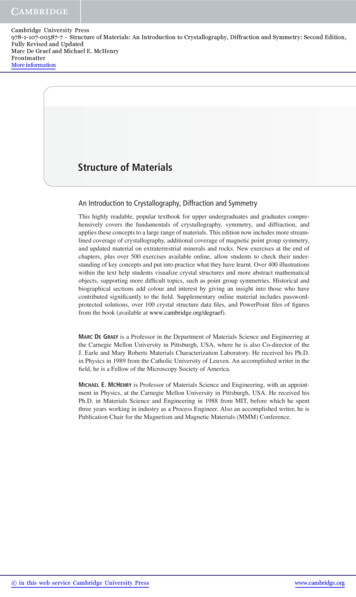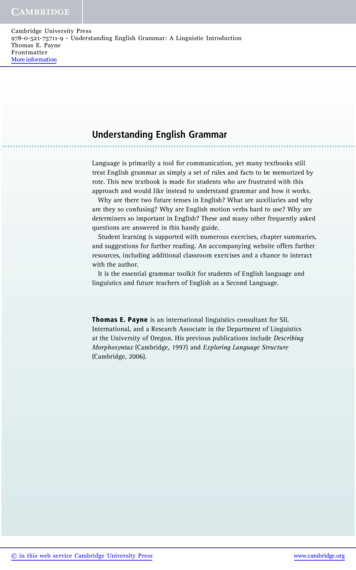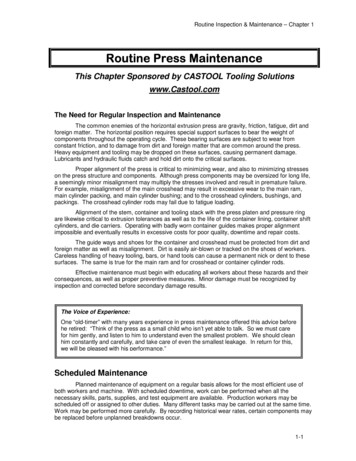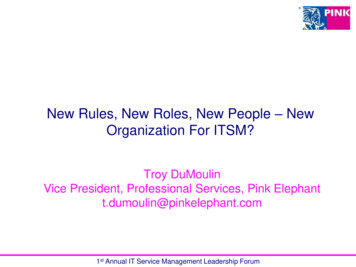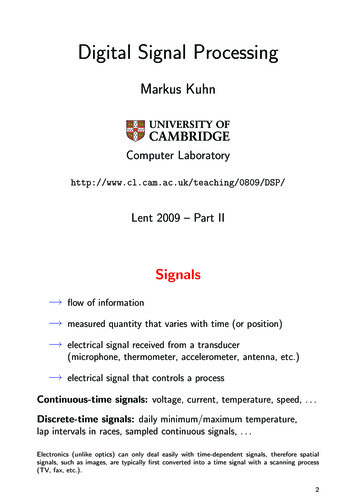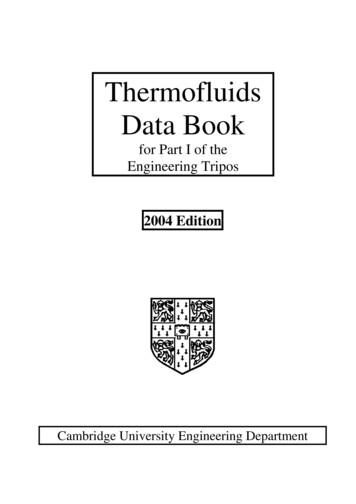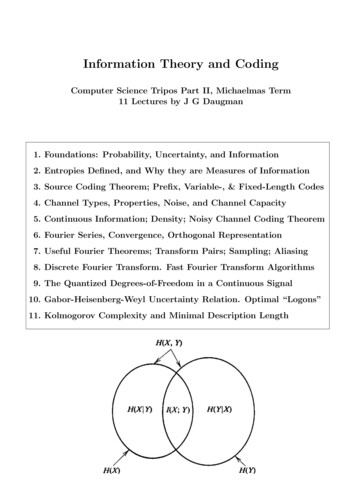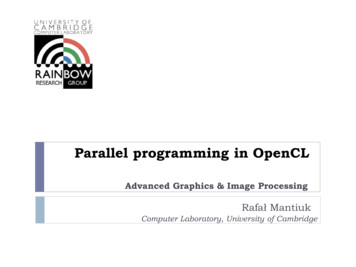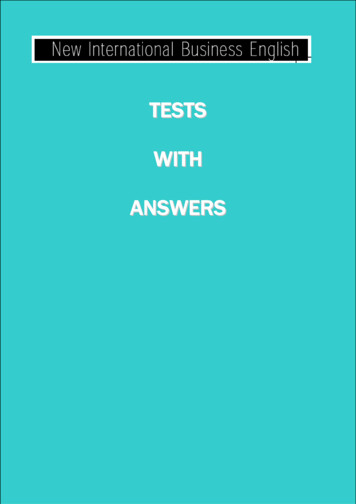
Transcription
TESTSWITHANSWERS
New International Business EnglishTestUNIT 1 Face to faceVocabularyEXCERCISE 1 Choose the best word to fit the gap.1A offence2C demonstrationsB responsibilitiesC challengesB solveD handshaking.D deadlineswork for her.C resolveB environmentD tacklestimulating.C applicationB sighingD opportunityI tend to think they are honest.C blinkingD sniffingusually gives other people information about how you really feel.B impressionC languageBob and Tony are businessA delegates10B mannersYour bodyA appearance9may help you to make deals more easily.If someone looks me straight in the eye withoutA yawning8D trickyPaul enjoys working at Small World because he finds theA installation7C formalLesley doesn’t like having to wait for other people toA generate6D behaviourIan has to be very organised as his work involves meeting tightA problems5C disasterto use the correct title when talking to business colleagues.B likelyHaving goodA entertaining4B problemIn some countries it is quiteA offensive3.It’s important to understand how other cultures behave so you don’t causeD relationshipand have arranged to meet at the sales conference.B customersC associatesD officersI’ve given the latest salesto Mr Allen but he hasn’t had a chance to look at them yet.A systemsC worksheetsB figuresD factsEXERCISE 2 Fill in the gaps with the correct nationality.1He lives in Holland so he must be2She comes from the USA so I think she’s3They speak French so they could be4He’s a5I became a Cambridge University Press 2000.or(France/Canada).but he can’t speak any Swedish.citizen when I married a woman from Hungary.
New International Business EnglishReadingEXERCISE 3 Put these sentences in the best order. Put a number, 1-4, in the space.1ABCDVery well, thanks. Let’s get down to business, shall we?I’m fine, thanks. How are you?Hello again! How are you getting on?Yes, all right.2ABCDMiss Smith, I’d like you to meet Mrs Jones.Oh, please call me Liz.How do you do, Mrs Jones?And I’m Claire.3ABCDOh, yes. I’ve heard of you.The name’s Alex White.I’d like to introduce myself.Pleased to meet you.4ABCDI wondered if I might take Friday off?Yes. Tony, of course.Oh, Friday’s rather difficult.Mrs Lang, could I have a word please?5ABCDWhat do you think?Yes, sure, Bob.Geoff, could you come over here a minute?Aha, yes, you’ve put a lot of work into it.Visit the New International Business English website: www.cambridge.org/elt/nibe Resources include: interactive exercises, a Business Englishglossary, articles and information on the Cambridge Business English Certificate examination. Cambridge University Press 2000
New International Business EnglishUNIT 2TestLetters, faxes and memosVocabularyEXERCISE 1 Choose the best word to fit the gap.1A letters2C communications D informationB overC throughThe annual general meeting wasA conducted4B correspondencePlease leave a message on the answer phone if you need to contact usA outside3to attend to on a Monday morning.There is always a lot ofoffice hours.D againstin the conference centre.B providedC runD heldadvantages of writing over talking to someone face-to-face is that you canOne of thetake your time.A remaining5D effectC sureD interestedyour application by the end of the week.B subjectC subscribeD subcontractagreement to supply Texmills with our products and services.B long-lastingManagers shouldA suggestD type.C impressionB pleasedThere has been aA long-winded10C namein attending, please let me know as soon as possible.You mustA submit9B reactionIf you areA concerned8B descriptionD relevantis correct.A well laid out letter always gives a goodA idea7C relativeMake sure that the addressee’s jobA title6B relatedC long-standingD long-livedstaff to maintain the no-smoking policy throughout the building.B encourage Cambridge University Press 2000C supportD co-operate
New International Business EnglishReadingEXERCISE 2 Fill in the appropriate word from the box.Dear Mr Jacobs,Thank you very much for your letter (1)request, we have (3)5 March. (2)in enclosing our latest (4)I would like to (5)answer to yourand price list.your attention to the special offers. These products are available at areduced price for a limited time only.If you would like any (6)information, please get in (7)I look (8)to hearing from you.Yours (9),with me.Howard JohnsonSales Manager(10): catalogue, price list, special offers isit the New International Business English website: www.cambridge.org/elt/nibe Resources include: interactive exercises, a Business Englishglossary, articles and information on the Cambridge Business English Certificate examination. Cambridge University Press 2000
New International Business EnglishTestUNIT 3 On the phoneVocabularyEXERCISE 1 Choose the best word to fit the gap.1A conformB conferA Hold on56D StayC throughD inthe wrong number.I’mMiss Johnson’s in a meeting.A worriedB afraidC throughD dialledC concernedD frightenednumber.No. This is the Finance Department. I’ll check theB externalC exteriorD extractionThere are no public phones in here but there is a phoneB operatorC boothWould you like me to fix up anB appointmentB misplacedfor you?C arrangementB politely Cambridge University Press 2000D attendance.C mistakenD misguided.You should always speak to customersA slowlyin Market Street.D switchboardDon’t make jokes on the phone as you may beA misunderstood10B offB doneA application9C Go onA putA room8D confirmto the Sales Department.Oh, dear. I think I’veA extension7B Keep onI’ll put youA over4C confine. I’ll see if Mr Watson is available.23the arrangements she made with you.Mrs Perez is writing toC carefullyD kindly
New International Business EnglishReadingEXERCISE 2 Choose one of the phrases from the boxes to complete these conversations.Conversation 1Bill:Hi, Sally. (1)changing the time of today’s meeting? Some time this afternoon wouldbe better for me.Sally:(2)I’ve got to finish that report today. Perhaps we could fix something up fortomorrow?Bill:(3)Sally:(4)Bill:O.K. Let’s get together tomorrow.if you need any help?Bill but I think (5)would you mindthat’s very kind of you.would you like a handI won’t be able toI’m sorry butdo you think you couldI’d prefer to do it myselfConversation 2Jim:Dr H.: (7)Jim:I go home early today?Dr Henderson, (6). Are you feeling O.K.?I’m fine but I’ve got a lot of preparation to do for that course I’m on.(8)take tomorrow morning off as well?Dr H.: No, (9)Jim:. The sales staff are coming in for a briefing.Oh, yes. I’d forgotten.Dr H. What about taking some holiday next week?Jim:No, thanks. (10). I’ll need to take some holiday later.I’m afraid you can’tI think I can manageDo you mind ifI’m sorry butYes, please. Thanks a lotDo you think I couldSure, go aheadVisit the New International Business English website: www.cambridge.org/elt/nibe Resources include: interactive exercises, a Business Englishglossary, articles and information on the Cambridge Business English Certificate examination. Cambridge University Press 2000
New International Business EnglishUNIT 4TestSummaries, notes, reportsVocabularyEXERCISE 1 Choose the best word to fit the gap.1A interest25D consultationbreaks when working at a computer.B lotsC repeatedD oftenB decidedC requested.D appointedMake sure that the mainof the report contains only relevant information.A businessC contentB bodyD formIf this project is completed on time we will receive aA bonus6C discountThe new Managing Director of the company has just beenA applied4B replacementIt’s important to takeA frequent3on all orders over 1000.Printix are offering us a 15%B batchC billin next month’s pay.D salarya thorough review of the health and safety provision within theHe was asked toorganisation.A underline789C undertakeD understandIf you’re taking notes it’s a good idea to make them as clear andA quickB briefAs aof the review, they decided to close the factory down.A conclusionB findingThere is aA unnecessary10B undergoThe consultantsA emphasised Cambridge University Press 2000C essentialC purposeas possible.D roughD resultdanger that the new regulations will be misunderstood by many staff.B badC unfortunateD gravethe importance of managers involving staff in the issue of timekeeping.B recommendedC motivatedD related
New International Business EnglishPunctuationEXERCISE 2 There is an incorrect punctuation mark in each of the lines of the texts. Underline each mistake and put thecorrect punctuation mark at the end of the line. The first one has been done as an example.Following your memorandum of 27 April; we carried outApril,study of staff view’s in three selected departments(1)to see, how the arrangements for breaks had been working.(2)I here summarise the results.(3) 65% office workers found the break arrangements satisfactory:(4) 25% would be in favour of a shorter lunch break;(5)EXERCISE 3 There is a missing punctuation mark in each of the lines of the texts. Underline the word next to where it shouldbe and put the correct punctuation mark at the end of the line. The first one has been done as an example.You also asked for my views on how to deal with unions I mentionedunions.that in some departments the break was lasting too long The union(1)representatives answer was not very helpful. She said the union(2)would always insist on the break being left as it is. In conclusion it(3)seems important to draw the Boards attention to possible difficulties(4)which the installation of clocking in machines could bring.(5)Visit the New International Business English website: www.cambridge.org/elt/nibe Resources include: interactive exercises, a Business English glossary,articles and information on the Cambridge Business English Certificate examination. Cambridge University Press 2000
New International Business EnglishTestUNIT 5 Working togetherVocabularyEXERCISE 1 Choose the best word to fit the gap.1A section210B upC extensiveD traditionalnew ideas.C onD outall their secretarial posts.B collapsedB synonymousB staffBuying inA bulk9D facilitiesC abolishedC systematicD failedwith progress.D syntheticThe development of new technologies means that there are fewer jobs for manualA workforce8B reliableOver the decades, the name of Siemens has becomeA symptomatic7.leader in the electrics and electronics market.Some companies haveA abandoned6D partC schemesMany employees are eager to tryA in5C areaB conveniencesSiemens is a highlyA innovative4B sectorShe took the job there because they provide good child-careA equipment3of industry.Telecommunication companies belong to the tertiaryC employeesD workerscan reduce unit costs.B amountsC volumeIf the workplace is a happy place, then staffis usually low.A structureB turnoverTheDepartment is responsible for sending out invoices.A AccountsB Purchasing Cambridge University Press 2000C changesD weightC SalesD takeoverD Production.
New International Business EnglishEXERCISE 2 Match the sectors on the right to sentences 1–5.1In developing countries most people are usually employed in agriculture.2During the 21st century we expect to see a huge expansion in3telecommunications.A primary sectorVehicle manufacturing has been an important industry in Western EuropeB secondary sectorfor many years.4C tertiary sectorThe discovery of oil in the Far East resulted in a rapid increase in thestandard of living for many people.5Service industries, such as catering and hotels, often pay low wages.EXERCISE 3 Match the descriptions 1–5 to the different functions of a company.1Creates new products.2In charge of the welfare of employees.3Keeps a record of all payments made and received.4Orders all supplies needed.A administrationB purchasingC personnelD research & developmentE sales & marketingF productionG accounts5Provides office services, e.g. typing.H legalVisit the New International Business English website: www.cambridge.org/elt/nibe Resources include: interactive exercises, a Business Englishglossary, articles and information on the Cambridge Business English Certificate examination. Cambridge University Press 2000
New International Business EnglishTestUNIT 6 International tradeVocabularyEXERCISE 1 Choose the best word to fit the gap.1A supplies2D exchanges.D compatibleagainst your first order.B replaceableC rechargeableD refundablefrom 27 April.B portableC availableD accessibleB emptiedC undoneimmediately.D unsentto keep the complete range in stock.B uneconomicC uncertainB in good shapeD invalidand its order book was full.C in good spiritsD in good healthArtemis gives us a good price on this because they are ourA single10C completedAfter rationalisation the company wasA in good time9B competentUnfortunately it isA insufficient8at the plant.The assignment arrives at the warehouse on Monday and will beA unloaded7D supplementsC redundanciesAll items in this range will beA suitable6B dealingsThe price of the catalogue isA removable5C supportersYou will see from the catalogue that our prices are veryA competitive4B suppliersUnfortunately the recent takeover will result in a number ofA rationalisations3have been working with us for a number of years.Most of ourB oneC individualsuppliers.D sole, including prices and deliveryI would be grateful if you could let me have a detailedterms.A quotationB term Cambridge University Press 2000C offerD order
New International Business EnglishEXERCISE 2 Match the words 1-5 to their definitions A-G. There are two extra definitions you do not need to use.A The cost and transportation of the goods, carriage paid,to a named destination in the buyer’s country.B This document is a receipt for goods loaded on a ship.C This price covers the cost, insurance and freight charges1CIF2EXW3CPT4irrevocable letter of credit5CFRto port of destination.D This document is evidence that goods have been sent by air.E This document ensures that the exporter will be paid.F This price includes cost and freight, but not insurance, to anamed port of destination in the buyer’s country.G This price covers the ex-works cost of goods, but not theinsurance and freight charges.ReadingEXERCISE 3 Fill in the appropriate word in gaps 1-5 from the box. There are three words you do not need to use.Thank you for your (1)enquiry about our AntiSpy SP 700 computer screen protector. Thisparticular model is available from (2)at this time. The special (3) 199 per unit or 499 for six. The (4)you would like to (5)introductoryregularprice isprice is 499. Please let me know by fax or e-mail ifan order at these prices as this offer will end on 31 March.stockwarehousereturnrecentconfirmplaceVisit the New International Business English website: www.cambridge.org/elt/nibe Resources include: interactive exercises, a Business Englishglossary, articles and information on the Cambridge Business English Certificate examination. Cambridge University Press 2000
New International Business EnglishTestUNIT 7 Money mattersVocabularyEXERCISE 1 Choose the best word to fit the gap.in the industry world-wide.D downward1The company saw net profits fall as a result of theA downfallB downgradeC downturn2It is important for many small businesses to improve their creditpay on time.A limitB controlC riskD term3All letters of credit should include an expiry date when payment isA calledB completeC readyD due.4We apologise for the difficulty we are experiencing in paying yourA delayedB waitingC outstandingD owingaccount.5Thank you for yourA remittanceB remission6The credit termsA remindthat payment should be on presentation of the goods.B stipulateC agreeD settle7It’s important toA take oncustomer references when offering credit.B take downC take upD take in8If you do not pay your bill within the next few days we will have to consider taking legalA prosecutionB actionC instructionD presentation9He was offered a bankA paymentB creditwhen the company experienced financial problems.C overdraftD debt10If customers fail toA meetB chargetheir bills you can be left with a serious cash-flow problem.C invoiceD stateand ensure customersof 500 which we received today.C remainsD remunerationEXERCISE 2 Match the words 1-5 to the definitions A-G. There are two extra definitions you do not need to use.1CWO2International money order3Documentary bill of exchange4Banker’s draft5Telegraphic transfer Cambridge University Press 2000AFastest method of sending money abroad.BA cheque drawn on an overseas bank.CPayment in advance of delivery.DPayment not required until after despatch of goods.EUsually the slowest method of payment.FCan be purchased from a bank and posted to supplier.GYour bank can instruct an overseas bank by airmail tomake a payment.
New International Business EnglishReadingEXERCISE 3 Fill in the appropriate word in gaps 1-5 from the box. There are three words you do not need to use.Dear Mr Becker,(1)our records your account is still overdue. We would like to remind you thatour (2)(4)of business are 30 days net. (3)unsettled debts, it is ourto take legal action. We would prefer not to take this course. May we ask you to settleyour account by (5). I am enclosing a copy of your invoice for your information.Yours sincerely,Mrs Jonestermsin the case offor examplenowaccording topolicyinstead ofreturnVisit the New International Business English website: www.cambridge.org/elt/nibe Resources include: interactive exercises, a Business Englishglossary, articles and information on the Cambridge Business English Certificate examination. Cambridge University Press 2000
New International Business EnglishTestUNIT 8 Dealing with problemsVocabularyEXERCISE 1 Choose the best word to fit the gap.1A injured27D damaged.D slipB incapableC unhelpful.D impotentin the order at the factory and the wrong package was sent.B mixtureC mixingB beyondC underD mixed-upour control.D inThere was a serious staffat the time so several shipments were held up.A shortageC decreaseB reductionThe complaint about the cost of the item was soonA dealt8C errorThe delay in despatch was due to circumstancesA above6B mistakeThere was aA mix-up5C destroyedThe customer complained that the assistant he spoke to had been mostA helpless4B hurtAll the cars in this particular range were recalled because of a designA fault3goods free of charge.We are happy to replace theB sortedC takenD contractionout.D clearedAs we were entirely responsible for the confusion your account has beenwith thefull amount.A debited9C givenThe poor quality of the products wasA caused10B addedB blamedThe customer demanded aA returnB repair Cambridge University Press 2000D creditedon inadequate supervision of the workforce.C explainedD putwhen he discovered the equipment was missing.C refundD reply
New International Business EnglishEXERCISE 2 Match the two halves of these sentences.1 There’s been a slight mix-upA but there seems to be some mistake.2 I’m sorry to bother youB for the late arrival of this flight.3 If you don’t send your engineer todayC we will be forced to cancel.4 I’m not at all satisfiedD over your recent order.5 Please accept our apologiesE with the reasons for the delay.ReadingEXERCISE 3 Fill in the appropriate word in gaps 1-5 from the box. There are three words you do not need to use.FAXDear Mr North,about your order. There was a (2)We very much regret the (1)fault thatday which resulted in a number of errors being made. Unfortunately, your order was one of those(3). This error has now been (4)and you should be receiving the goods inthe next few days.We are very sorry about the (5)caused.Yours sincerely,Jill SouthCustomer Care Officerelectricaffectedput uterVisit the New International Business English website: www.cambridge.org/elt/nibe Resources include: interactive exercises, a Business Englishglossary, articles and information on the Cambridge Business English Certificate examination. Cambridge University Press 2000
New International Business EnglishTestUNIT 9 Visitors and travellersVocabularyEXERCISE 1 Choose the best word to fit the gap.1A book2.C defeatD crashso that we can arrange transport.B mapC itineraryB cateringC waiterThe journey took ages. We were stuck in a trafficA queue6B collapseD arrangeThe hotel restaurant is not open 24 hours but roomA menu5C registerPlease send us a copy of herA journey4B reconfirmTheir flight was delayed due to engineA failure3your seat 24 hours before departure or they may cancel your reservation.You need toB jamC hold-upD routeis always available.D serviceas soon as we left the airport.D blockbooked into the Hotel du Lac but they can move to somethingThe delegates aremore luxurious if they want.A provisionally7B seeingC check inB facilitiesC overlookingC opportunitiesIn the interests of safety it’s a good idea to walkA confidentlyB convincingly Cambridge University Press 2000D conditionallyat the airport.D check onthe back of the hotel as it’s usually quieter.The conference speakers will require photocopyingA amenities10B check outI always choose a roomA showing9C temporarilyMake sure that you allow plenty of time toA check up8B approximatelyC confidentiallyD viewingthroughout their stay.D applianceswhen visiting a place for the first time.D consciously
New International Business EnglishReadingEXERCISE 2 Choose one of the phrases from the boxes to complete these conversations. There are three phrases you do notneed to use.Conversation 1Tourist:Excuse me. How do I get to the Europa Hotel?Local person:Ah. It’s (1)Tourist:Oh, dear. Is it far?Local Person:Not really. It’ll (2). Now when you leave the station (3)and after about 500 metres you’ll come to the town hall. (4)this road foranother 300 metres till you come to a church on a big square. (5)is theHotel Europa.Tourist:Thanks a lot.turn lefta bit complicatedcan’t miss itcontinue alongtake about 10 minutes on footopposite the churchjust afterwhen you get toConversation 2Host:What would you like to eat?Guest:I’m not sure. (1)Host:It’s chicken with tomatoes. It’s a (2)Guest:(3). I’ll have that, please.Host:(4)I’ll have the soup, (5)speciality of the regiondifficult to explainwhat this is?to start withfollowed by.by the chicken.can you tell meI’ll ask the waiterthat sounds very niceI don’t like the sound of thatVisit the New International Business English website: www.cambridge.org/elt/nibe Resources include: interactive exercises, a Business Englishglossary, articles and information on the Cambridge Business English Certificate examination. Cambridge University Press 2000
New International Business EnglishTestUNIT 10 MarketingVocabularyEXERCISE 1 Choose the best word to fit the gap.1A promoting2a new range of health foods over the next few months.The company will beB encouragingC competingD supportingfor the past two years we are expecting a sharp riseAlthough prices have remainedin the near future.A still3This particularA name4B brandC labelD productB outlets.C outlinesD outfitsfor the next few months is not particularly optimistic.B driveC forecastD trendThe advertising company have come up with a catchy newA slogan7D staticof ice cream is supposed to contain very little fat.The salesA figures6C sameTheir products are only available through selectedA outlooks5B immobileB sayingC imageIt’s going to be difficult to breakfor the car.D featurethe Far East market but I believe it will become akey market for us.A through8C intoD downWe’re hoping that the new software package is going to make a bigA effect9B upB impactSupermarkets often find point of saleC influence.D markvery useful when introducing new products totheir customers.A displays10B exhibitsC presentationsD exhibitionsWhen deciding what kind of advertising to use it’s important to find out as much as possible aboutyour.A companionsB competitions Cambridge University Press 2000C competitorsD components
New International Business EnglishReadingEXERCISE 2 Match sentences 1–5 to the words in the box.1“I’m concerned that our customers may feel we are charging too muchfor this product.”Total Product2“We need to ensure that we keep a high profile. People should bereminded of our good reputation and image.”Unique Selling Proposition3“What makes this computer special is its unique design. There isn’tanything else like it on the market.”Public Relations4“We have to consider everything about the product not just what itlooks like or what it’s called.”5“I buy these jeans because they have a designer label. They make mefeel expensive.”Price-consciousProduct ImageEXERCISE 3 Put these sentences in order of probability. Begin with the highest probability.1It’s quite possible that we will see sales increase in the UK.2I don’t think we are going to see any improvement for some time.3There’s no doubt that these figures are accurate.4It’s just possible that interest rates will go down.5This definitely isn’t a good time for our product range.Visit the New International Business English website: www.cambridge.org/elt/nibe Resources include: interactive exercises, a Business Englishglossary, articles and information on the Cambridge Business English Certificate examination. Cambridge University Press 2000
New International Business EnglishTestUNIT 11 MeetingsVocabularyEXERCISE 1 Choose the best word to fit the gap.1It was decided toA finish2B holdCopies of theA proposal3the meeting until after lunch.C adjournD interruptfor the meeting were distributed to the heads of departments.B summaryThe management committeeC planD agendathat flexitime should be limited to permanent membersof staff.A stipulated4The members were asked toA conclude5B requiredB voteC askedD wantedon the proposal to introduce flexitime.C electD optThey agreed that the system wasn’t working well and there was a need toa moreradical approach.A choose6B designateC preferD adoptto business as quickly as possible as there was a lotThe chair suggested that we gotto get through.A on710B opinionHe thanked the managementA with9C downD aboutShe made sure that everyone was able to express their points ofA view8B upB onC idea.D impressionbehalf of the staff for taking their suggestions seriously.C inD forThe management decidedto accept the proposals put forward by the committee.A unanimouslyC completelyB altogetherHe was unable to stay for theA timeB length Cambridge University Press 2000D totallyof the meeting as he had other business to attend to.C extentD duration
New International Business EnglishReadingEXERCISE 2 Put sentences A-F under the correct headings.1Tips for chairing a meeting2Proposals3Agenda4SummaryA Flexitime: discuss staff suggestions and management stipulations.B Provide more car-parking places.C Make sure everyone has a chance to give their views.D Flexible hours should only be worked on Mondays and Fridays.E If there is disagreement on any point, call for a vote.FThe meeting ended at 5.15 pm.G Any other business.H It was agreed that most people were happy with the present system.IThere should be ‘core time’ for all staff.JArrangements for the Company picnic.Visit the New International Business English website: www.cambridge.org/elt/nibe Resources include: interactive exercises, a Business Englishglossary, articles and information on the Cambridge Business English Certificate examination. Cambridge University Press 2000
New International Business EnglishUNIT 12TestProcesses and operationsVocabularyEXERCISE 1 Choose the best word to fit the gap.1A invested2in how a photocopier works are clearly explained in the manual.The operationsB inventedC involvedD investigatedas long as you can describeIt doesn’t matter if you don’t know all the technicalthe process.A conditions3C particularsD qualificationsThere was a major breakdown in the factory so the assembly line was brought to aA stoppage4B termsB closeC halt.D pauseThe temperature of the chocolate mixture has to be carefullyas it affects textureand flavour.A monitored5Paper can getA fixed689B joinedC connectedB preciseC definiteB forFullare given on the back of the packet.A instructionsB operationsC withC outlinesThere was no room in the warehouse as allB availableA microprocessor Cambridge University Press 2000D stuckspeeds to ensure a consistent mix.D particularlyall the latest electronic gadgets.A onA contractsD surveyedto the drum or between the rollers.This model is fittedA allowable10C followedThe motor should rotate the wheels at veryA correct7B guidedC attainableD upD functionsspace was taken up with unsold machinery.D applicabletemperature changes.B conveysC controlsD converts
New International Business EnglishReadingEXERCISE 2 Complete the flowchart, showing how chocolate is made, by putting the sentences (A-H) in the correct order. 2 3 F 5 H 6 71 4 8 CA While the kibbling is taking place the shells are blown away by air currents.B When the chocolate beans arrive at the factory they are sorted out and cleaned.C This solid mass is used to make a variety of chocolate products.D The grinding reduces the nibs to a thick, hot liquid known as ‘mass’.E The mass is allowed to cool and, as it does so, it solidifies.F The next process, called kibbling, involves breaking down the beans into small pieces.G Then the beans are fed into revolving drums where they are roasted.H When all the shells have been removed, the small pieces of bean or ‘nibs’ are ground in mills.EXERCISE 3 Read this conversation and fill in the gaps by choosing phrases from the box. There are two phrases you do notneed to use.A: (1), collect all the things you need for the recipe.B: I see.A: (2)is to put all the ingredients in a bowl and mix them together.B: I’m with you, so far.A: (3)everything is blended well together. You don’t want any lumps!B: (4)to make the mixture as smooth as possible?A: Yes, that’s right. You then put the mixture into a greased cake tin and pop it in a preheated oven.(5). Not very difficult, is it?B: I can’t wait to try!And then finallyBe
New International Business English UNIT 1Face to face Vocabulary EXCERCISE 1 Choose the best word to fit the gap. 1 It’s important to understand how other cultures behave so you don’t cause . A offence B problem C disaster D behaviour 2 In some countries it is quite to use the correct ti
